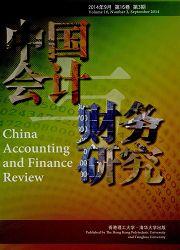CEO power and CSR: the moderating role of CEO characteristics
引用次数: 4
Abstract
PurposeThe purpose of this study is to examine the moderating role of the characteristics of the chief executive officer (CEO) on the association between CEO power and corporate social responsibility (CSR) performance.Design/methodology/approachThis paper conducts multiple regression analyses to empirically test the proposed hypotheses based on a sample of US-based publicly held companies. The sample period extends from 2000 to 2018. Firm-level CSR ratings are obtained from the Kinder, Lydenberg and Domini (KLD) database (currently known as MSCI ESG STATS). Financial data and CEO data are retrieved from Compustat and ExecuComp databases, respectively. Additional test and robustness analysis are performed.FindingsThis paper shows that firms with more powerful CEOs are less likely to engage in CSR activities. The negative association between CEO power and CSR is found to be exacerbated by CEOs who are younger, more competent and overconfident; however, this negative association is mitigated by CEOs who are female. This paper also finds that gender plays a more important role among CEO characteristics. Collectively, the findings highlight the potential opportunities to better understand the role of various CEO characteristics that jointly affect CSR.Originality/valueFirst, this is the first study providing a comprehensive empirical analysis of how various CEO characteristics jointly affect CSR. Prior studies that focus on standalone CEO characteristics offer an incomplete picture of the relation between a single CEO characteristic and a firm's CSR performance. The current study thus extends the research field by examining the association between seemingly unrelated CEO characteristics and CSR performance. The results also highlight that gender is the critical factor moderating the relationship between CEO power and CSR performance when it is compared with CEO age, ability and overconfidence. Second, the authors add to the literature on employee selection by showing that female CEOs mitigate the negative effect of managerial power on CSR performance. Although the currently available empirical research in management control systems focuses on ex-post analyses of moral hazard mitigation for incumbent employees, both the economics and management literature acknowledge ex ante evidence suggesting that employee selection is even more important. Our findings may provide insight into the selection of CEOs.CEO权力与社会责任:CEO特征的调节作用
目的本研究的目的是检验首席执行官(CEO)特征在CEO权力与企业社会责任绩效之间的关联中的调节作用。本文以美国上市公司为样本,进行多元回归分析,对提出的假设进行实证检验。样本周期为2000年至2018年。企业层面的CSR评级来自Kinder, Lydenberg and Domini (KLD)数据库(目前称为MSCI ESG STATS)。财务数据和CEO数据分别从Compustat和ExecuComp数据库检索。进行了额外的测试和稳健性分析。研究结果表明,ceo权力越大的企业参与企业社会责任活动的可能性越小。CEO权力与企业社会责任的负相关关系在CEO年龄越年轻、能力越强、过于自信的情况下越明显;然而,这种负面关联在女性ceo身上得到了缓解。本文还发现,性别在CEO特征中起着更重要的作用。总的来说,这些发现突出了更好地理解共同影响企业社会责任的各种CEO特征的作用的潜在机会。首先,这是第一个对CEO的不同特征如何共同影响企业社会责任进行全面实证分析的研究。先前的研究聚焦于CEO的独立特征,对于CEO的单一特征与企业社会责任绩效之间的关系提供了一个不完整的图景。因此,本研究扩展了研究领域,考察了看似无关的CEO特征与企业社会责任绩效之间的关系。与CEO年龄、能力和过度自信相比,性别是调节CEO权力与企业社会责任绩效关系的关键因素。其次,作者补充了关于员工选择的文献,表明女性ceo缓解了管理权力对企业社会责任绩效的负面影响。尽管目前对管理控制系统的实证研究侧重于对在职员工道德风险缓解的事后分析,但经济学和管理学文献都承认,事前证据表明,员工选择更为重要。我们的发现可能会对ceo的选择提供一些见解。
本文章由计算机程序翻译,如有差异,请以英文原文为准。
求助全文
约1分钟内获得全文
求助全文

 求助内容:
求助内容: 应助结果提醒方式:
应助结果提醒方式:


